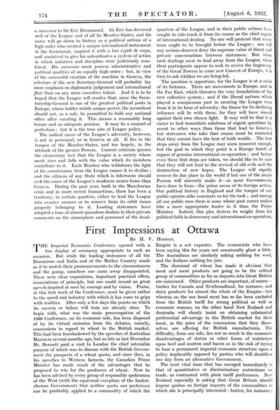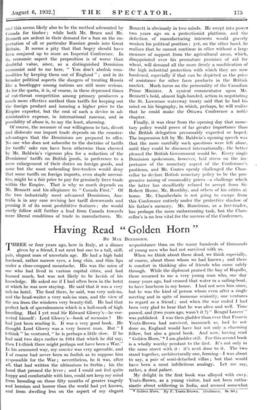First Impressions at Ottawa By H. V. HODSON.
THE Imperial Economic Conference opened with a fine display of ceremony appropriate to such an occasion. But while the leading statesmen of all the Dominions and India and of the Mother Country made as if to match their pronouncements to the circumstances and the pomp, somehow one came away disappointed. There were clear expositions, important practical offers, enunciations of principle, but one could record no great speech inspired at once by courage and by vision. Praise, in this first week of the Conference, must be given rather to the speed and industry with which it has come to grips with realities. After only a few days the points on which its success or failure will turn are already clear. To begin with, what was the main preoccupation of the 1980 Conference, on its economic side, has been disposed of by its virtual omission from the debates, namely, concessions in regard to wheat in the British market. This had been foreshadowed by the speeches of Australian Ministers several months ago, but as late as last December Mr. Bennett paid a visit to London the chief ostensible purpose of which was to discuss with the British Govern- ment the prospects of a wheat quota, and since then, in his speeches to Western farmers, the Canadian Prime Minister has made much of the advantages that he proposed to win for the producers of wheat. Now he has been advised by every group of responsible spokesmen of the West (with the equivocal exception of the Saskat- chewan Government) that neither quota nor preference can be profitably applied to a commodity of which the Empire is a net exporter. The economists who have been saying this for years not unnaturally gloat a little. The Australians are similarly asking nothing for wool, • and the Indians nothing for jute.
The dismissal of wheat has made it obvious that meat and meat products are going to be the critical group of commodities as far as imports into Great Britain are concerned. Other products are important, of course— timber for Canada and Newfoundland, for instance, and dairy products for almost the whole of the Empire—but whereas on the one hand meat has so far been excluded from the British tariff for strong political as well as economic reasons, on the other hand New Zealand and Australia will clearly insist on obtaining substantial preferential advantage in the British market for their meat, as the price of the concessions that they them- selves are offering for British manufactures. The difficulty, from our side, lies not so much in the economic disadvantages of duties or other forms of restriction upon beef and mutton and bacon as in the risk of trying to base a permanent imperial economic structure upon a policy implacably opposed by parties who will doubtless one day form an alternative Government.
The next vital issue that has emerged immediately is that of quantitative or discriminatory restrictions on trade, as contrasted with plain tariff preferences. New Zealand especially is asking that Great Britain should impose quotas on foreign imports of the commodities in which she is principally interested—butter, for instance ; and this seems likely also to be the method advocated by Canada for timber ; while both Mr. Bruce and Mr. Bennett are ardent in their demand for a ban on the im- portation of all or particular Russian goods into Great Britain. It seems a pity that that bogey should have been conjured up to scare an Imperial Conference. In its economic aspect the proposition is of worse than doubtful value, since, as a distinguished Dominion economist said to me here, " You don't abolish com- modities by keeping them out of England " ; and in its broader political aspects the dangers of treating Russia like a bootlegger among nations are still more serious. As for the quota, it is, of course, in these depressed times of cut-throat competition among primary producers a much more effective method than tariffs for keeping out the foreign product and insuring a higher price to the Empire exporter, but the cost of such a device in ad- ministrative expense, in international rancour, and in possibility of abuse is, to say the least, alarming.
Of course, the measure of our willingness to tax, divert and dislocate our import trade depends on the counter- advantages that the Dominions are prepared to offer. No one who does not subscribe to the doctrine of tariffs for tariffs' sake can have been otherwise than cheered by Mr. Baldwin's vigorous plea for a reduction of the Dominions' tariffs on British goods, in preference to a mere enlargement of their duties on foreign goods, and none but the most unbending free-traders would deny that some tariffs on foreign imports, even staple necessi- ties, might be a fair price to pay for genuinely freer trade within the Empire. That is why so much depends on Mr. Bennett and his allegiance to "Canada First." Of the two industrially most advanced Dominions, Aus- tralia is in any case revising her tariff downwards and pruning it of its most prohibitive features ; she would surely follow still further a lead from Canada towards more liberal conditions of trade in manufactures. Mr. Bennett is obviously in two minds. He swept into power two years ago on a protectionist platform, and the defection of manufacturing interests would gravely weaken his political position ; yet, on the other hand, he realizes that he cannot continue in office without a large measure of support from the agricultural areas, which, disappointed over his premature promises of aid for wheat, will demand all the more firmly a modification of the high industrial protection with which they are now burdened, especially if that can be depicted as the price of assistance for other farm products in the British market. Much turns on the personality of the Canadian Prime Minister. A cynical commentator upon Mr. Bennett's bold, almost high-handed, action in negotiating the St. Lawrence waterway treaty said that he had his mind on his biography, in which, perhaps, he will realize that he could make the Ottawa Conference a noble chapter..
Finally, it was clear from the opening day that mone- tary policy would prove of far greater importance than the British delegation presumably expected or hoped. The impression left by Mr. Baldwin's opening speech was that the more carefully such questions were left alone, until they could be discussed internationally, the better pleased .the British Government would be. Every single Dominion spokesman, however, laid stress on the im- portance of the monetary aspect of the Conference's problems, and Mr. Coates openly challenged the Chan- cellor to declare British monetary policy to be the pro- gressive raising of commodity prices—a challenge which the latter has steadfastly refused to accept from Sir Robert Horne, Mr. Boothby, and others of his critics at home. Mr. Chamberlain is not going to escape from this Conference entirely under the protective shadow of his father's memory. Mr. Runcirnan, as a free-trader, has perhaps the more embarrassing task, but the Chan- cellor's is no less vital for the success of the Conference.



























 Previous page
Previous page